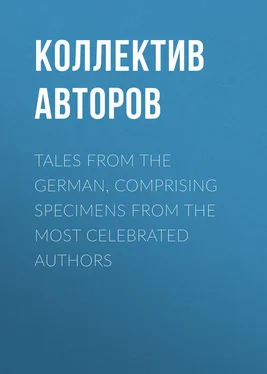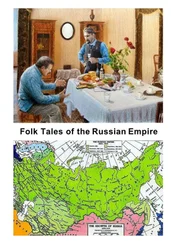Коллектив авторов - Tales from the German, Comprising specimens from the most celebrated authors
Здесь есть возможность читать онлайн «Коллектив авторов - Tales from the German, Comprising specimens from the most celebrated authors» — ознакомительный отрывок электронной книги совершенно бесплатно, а после прочтения отрывка купить полную версию. В некоторых случаях можно слушать аудио, скачать через торрент в формате fb2 и присутствует краткое содержание. Жанр: literature_18, foreign_antique, foreign_prose, Сказка, на английском языке. Описание произведения, (предисловие) а так же отзывы посетителей доступны на портале библиотеки ЛибКат.
- Название:Tales from the German, Comprising specimens from the most celebrated authors
- Автор:
- Жанр:
- Год:неизвестен
- ISBN:нет данных
- Рейтинг книги:4 / 5. Голосов: 1
-
Избранное:Добавить в избранное
- Отзывы:
-
Ваша оценка:
- 80
- 1
- 2
- 3
- 4
- 5
Tales from the German, Comprising specimens from the most celebrated authors: краткое содержание, описание и аннотация
Предлагаем к чтению аннотацию, описание, краткое содержание или предисловие (зависит от того, что написал сам автор книги «Tales from the German, Comprising specimens from the most celebrated authors»). Если вы не нашли необходимую информацию о книге — напишите в комментариях, мы постараемся отыскать её.
Tales from the German, Comprising specimens from the most celebrated authors — читать онлайн ознакомительный отрывок
Ниже представлен текст книги, разбитый по страницам. Система сохранения места последней прочитанной страницы, позволяет с удобством читать онлайн бесплатно книгу «Tales from the German, Comprising specimens from the most celebrated authors», без необходимости каждый раз заново искать на чём Вы остановились. Поставьте закладку, и сможете в любой момент перейти на страницу, на которой закончили чтение.
Интервал:
Закладка:
Considered from this point of view, the usual mode of treating history is open to much objection, and herein, I think, lies the difficulty, owing to which the study of history has always been so unfruitful for civil life. Between the vehement emotions of the man in action, and the quiet mind of the reader, to whom the action is presented, there is such a repelling contrast, such a wide interval, that it is difficult, nay, impossible for the latter, even to suspect a connexion. A gap remains between the subject of the history and the reader which cuts off all possibility of comparison or application, and which, instead of awakening that wholesome alarm, that warns too secure health, merely calls forth the shake of the head denoting suspicion. We regard the unhappy person, who was still a man as much as ourselves, both when he committed the act and when he atoned for it, as a creature of another species, whose blood flows differently from our own, and whose will does not obey the same regulations as our own. His fate teaches us but little, as sympathy is only founded on an obscure consciousness of similar peril, and we are far removed even from the bare suspicion of such similarity. The relation being lost, instruction is lost with it, and history, instead of being a school of cultivation, must rest content with the humble merit of having satisfied our curiosity. If it is to become any thing more and attain its great purpose, it must choose one of these two plans: either the reader must become as warm as the hero, or the hero must become as cold as the reader.
I am aware that many of the best historians, both of ancient and modern times, have adhered to the first method, and have gained the heart of their reader, by a style which carries him along with the subject. But this is an usurpation on the part of the author, and an infringement on the republican freedom of the reading public, which is itself entitled to sit in judgment: it is at the same time a violation of the law of boundaries, since this method belongs exclusively and properly to the orator and the poet. The last method is alone open to the historian.
The hero then must be as cold as the reader or – what comes to the same thing – we must become acquainted with him before he begins to act; we must see him not only perform, but will his action. His thoughts concern us infinitely more than his deeds, and the sources of his thoughts still more than the consequences of his deeds. The soil of Vesuvius has been explored to discover the origin of its eruption; and why is less attention paid to a moral than to a physical phenomenon? Why do we not equally regard the nature and situation of the things which surround a certain man, until the tinder collected within him takes fire? The dreamer, who loves the wonderful is charmed by the singularity and wonder of such a phenomenon; but the friend of truth seeks a mother for these lost children. He seeks her in the unalterable structure of the human soul, and in the variable conditions by which it is influenced from without, and by searching both these he is sure to find her. He is now no more astonished to see the poisonous hemlock thriving in that bed, in every other part of which wholesome herbs are growing, to find wisdom and folly, virtue and vice, together in the same cradle.
Not to mention any of the advantages which psychology derives from such a method of treating history, this method has alone the preference, because it uproots the cruel scorn and proud security with which erect and untempted virtue commonly looks down upon the fallen, because it diffuses the mild spirit of toleration, without which no fugitive can return, no reconciliation between the law and its offender is possible, no infected member of society can escape utter mortification.
Had the criminal of whom I am now about to speak a right to appeal to that spirit of toleration? Was he really lost for the body of the state, without a possibility of redemption? I will not anticipate the reader's verdict. Our leniency will no more avail him, since he perished by the hand of the executioner, but the dissection of his crime will perhaps instruct humanity, and possibly instruct justice also.
Christian Wolf was the son of an innkeeper in a provincial town (the name of which must be concealed for reasons which will be obvious in the sequel), and, his father being dead, he assisted his mother in the business till his twentieth year. The business was bad, and Wolf had many an idle hour. Even from his school days he was notorious as a loose kind of fellow. Grown up girls complained of his audacity, and the lads of the town reverenced his inventive powers. Nature had neglected his person. A little insignificant figure, curly hair of an unpleasant blackness, a flat nose, and a swollen upper lip, which had been moreover put out of its place by the kick of a horse, gave a repulsiveness to his appearance, which scared all the women away from him, and afforded abundant material for the wit of his comrades.
Obstinately did he endeavour to gain what had been denied him; because he was unpleasant he determined to please. He was sensual, and persuaded himself that he was in love. The girl whom he chose ill-treated him; he had reason to fear his rivals were more fortunate; nevertheless the girl was poor. A heart that was closed to his endearments might possibly open to his presents, but he himself was oppressed by want, and his vain endeavour to produce an effective exterior absorbed the small gains of his miserable business. Too indolent and too ignorant to restore his dilapidated affairs by speculation, too proud, and also too delicate to exchange the condition of master which he had hitherto held, for that of peasant, he saw but one path before him – a path which thousands before and after him have taken with better success – that of stealing honestly. His native town bordered on a wood, which belonged to the sovereign; he turned poacher, and the profits of his depredations were faithfully placed in the hands of his mistress.
Among the lovers of Johanna was Robert, a huntsman in the service of the forester. This man soon perceived the advantage which had been gained over him by the liberality of his rival, and filled with envy, he investigated the source of this change. He appeared more frequently at the Sun – this was the sign of the inn – and his watchful eye, sharpened by envy and jealousy, soon showed him whence the money had been procured. A short time before, a severe edict had been revived against poachers, condemning transgressors to the house of correction. Robert was unwearied in observing the secret paths of his rival, and finally succeeded in catching the unwary man in the very fact. Wolf was apprehended, and it was only by the sacrifice of all his property, that he was able – and then with difficulty – to escape the awarded punishment by a fine.
Robert triumphed. His rival was beaten out of the field, and Johanna's favour was at an end, now he was a beggar. Wolf knew his enemy, and this enemy was the happy possessor of Johanna. An oppressive feeling of want was combined with offended pride, necessity and jealousy raged together against his sensitiveness, hunger drove him out upon the wide world, revenge and passion held him fast. For a second time he turned poacher, but Robert's redoubled vigilance was again too much for him. Now he experienced all the severity of the law, for he had nothing more to give, and in a few weeks he was consigned to the house of correction attached to the capital.
This year of punishment had passed, absence had increased his passion, and his stubbornness had become greater under the weight of his misfortune. Scarcely had he regained his freedom than he hastened to the place of his birth to show himself to his Johanna. He appeared, and all shunned him. Pressing necessity at last subdued his pride, and overcame his sense of personal weakness, – he offered himself to the opulent of the place, as willing to serve for daily hire. The farmer shrugged his shoulders as he saw the weakly looking creature, and the stout bony frame of a rival applicant was decisive against him in the mind of the unfeeling patron. He made one effort more. One office was still left – the very last post of an honest name. He applied for the vacant place of herdsman of the town, but the peasant would not trust his pigs to a scape-grace. Frustrated in every effort, rejected at every place, he became a poacher for the third time, and for a third time had the misfortune of falling into the hands of his watchful enemy.
Читать дальшеИнтервал:
Закладка:
Похожие книги на «Tales from the German, Comprising specimens from the most celebrated authors»
Представляем Вашему вниманию похожие книги на «Tales from the German, Comprising specimens from the most celebrated authors» списком для выбора. Мы отобрали схожую по названию и смыслу литературу в надежде предоставить читателям больше вариантов отыскать новые, интересные, ещё непрочитанные произведения.
Обсуждение, отзывы о книге «Tales from the German, Comprising specimens from the most celebrated authors» и просто собственные мнения читателей. Оставьте ваши комментарии, напишите, что Вы думаете о произведении, его смысле или главных героях. Укажите что конкретно понравилось, а что нет, и почему Вы так считаете.












